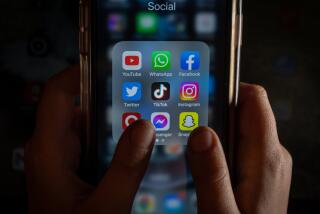Learning the Rules of Cyberspace
- Share via
The Internet might be the new frontier, but it’s by no means lawless. Plagiarism, invasion of privacy and unfair use of materials for class and homework projects are no more legal, ethical or acceptable in high-tech classrooms than in traditional classrooms.
To ensure that kids grow up to be responsible digital citizens, parents and educators need to emphasize what kind of behavior--from just plain netiquette to actual points of law--is and is not acceptable online.
A good place to start is with your school’s Acceptable Use Policy, or AUP, a legal contract addressing how technology is used at school as well as specific student behaviors and responsibilities online. Ideally, AUPs are a collaborative effort of parents, teachers and administrators and should be written in kid-friendly terms, clearly stating the consequences of not following them.
AUPs can be customized for different districts, grade levels and instructional settings. In general, they can be wonderful springboards for discussions on ethics in general. Here are some examples of ways to get the conversation started:
* Privacy. Emphasize the importance of keeping passwords secret. This includes not using others’ passwords to get into private e-mail or personal files. Talk to younger kids about how this is the same as breaking into a locked file cabinet or reading somebody’s diary. Discuss how the person might feel and how important privacy is. With older students, discuss the potential harm that hackers can cause by breaking into the secure data of individuals or companies. A good lesson plan for middle and high school teachers on privacy and hacking can be found at the U.S. Department of Education’s guidelines for teachers at https://www.usdoj.gov/kidspage/netiquet.htm.
* Copyright on the Internet. It might be news to students that Internet pages are copyrighted automatically, which means that it is not OK to cut and paste something onto a school’s Web site, even if they credit the site. Kids should also know that while trading one software game for another on the Internet might seem harmless, it is actually stealing. Discuss the ways in which this behavior is harmful to the software companies that develop these products. Ask kids whether they would walk into a store and steal a box of software. For more on copyright, go to https://www.loc.gov/copyright, where the entire U.S. copyright law is downloadable, or check out the Copyright Web site at https://www.benedict.com for clear case law examples.
* Plagiarism. Borrowing or trading a research paper from the Internet and submitting it under your own name is cheating. Appropriating information word for word from an encyclopedia or other source without using quotation marks and a citation also is cheating. Ask kids whether they would copy from someone else’s paper in class or how they would feel if someone took their hard work and claimed it as his or her own. Discuss the importance of paraphrasing, using numerous reference sources and getting started on projects far enough in advance to do thorough research. The U.S. Department of Education’s technology division offers a very good quiz as well as Internet guidelines for kids at https://www.usdoj.gov/kidspage/do-dont/kidinternet.htm.
* Safe surfing. Another important job of an AUP is to ensure that kids are kept safe from inappropriate Internet sites and people seeking to cause harm. Review and post rules about never revealing personal information, such as last name, e-mail address, phone number, school name, computer password or picture to anyone or any site without parental or teacher approval. And although most schools use filtering software, it’s not always foolproof. Be sure kids know the drill when encountering offensive material, such as immediately hitting the Back button and informing the adult in charge. Arranging classroom computers so the screens are visible to all is a good way for teachers to monitor activity. The Children’s Online Privacy Protection Act, enacted in late 1999 and aimed at kids ages 13 and younger, details specific restrictions for Web use. The address is https://www.cdt.org/legislation/105th/privacy/coppa.html.
* Mind your manners. Although the anonymity of the Internet can sometimes tempt users to behave in ways they would never dream of in person, it is important to stress that courtesy and proper language are just as important in online communications as they are in any other setting.
*
Susan McLester is editor of Technology & Learning magazine.
(BEGIN TEXT OF INFOBOX / INFOGRAPHIC)
Helpful
Web Sites
Privacy Guidelines
for Teachers
https://www.usdoj.gov/kidspage/netiquet.htm
Copyright Rules
https://www.loc.gov/copyright/https:///www.benedict.com
Plagiarism Guidelines
for Kids
https://www.usdoj.gov/kidspage/do-dont/kidinternet.htm
Safe Surfing
https://www.cdt.org/legislation/105th/privacy/coppa.html






